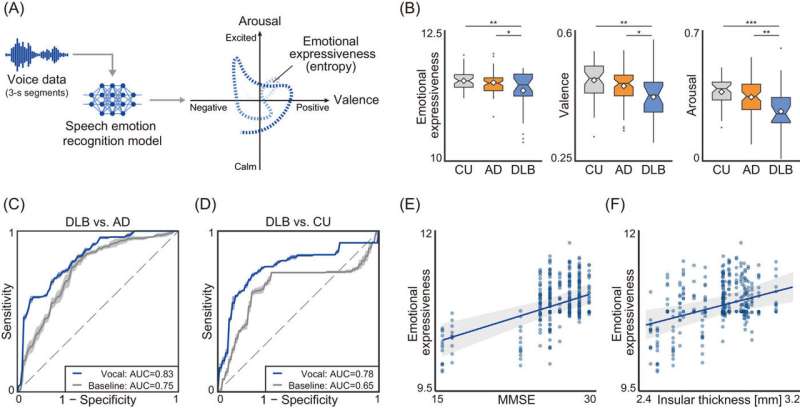This article has been reviewed according to Science X's editorial process and policies. Editors have highlighted the following attributes while ensuring the content's credibility:
fact-checked
trusted source
proofread
AI-driven tool can detect Lewy body dementia via changes in vocal emotional expression

Researchers at University of Tsukuba and IBM Research identified, for the first time, disease-specific reduction in emotional expressivity in Lewy body dementia by quantifying vocal expression of emotions using deep neural network techniques. This reduction in vocal emotional expressions was associated with cognitive impairment and specific brain region atrophy and could serve as a distinguishing factor for individuals with Lewy body dementia.
Lewy body dementia is the second most prevalent neurodegenerative dementia after Alzheimer's disease. It progresses faster and has a broader range of symptoms compared with other forms of dementia, significantly decreasing patients' quality of life.
However, because of overlapping symptoms with other diseases such as Alzheimer's and the limited availability of specialized physicians and facilities, Lewy body dementia often goes undiagnosed.
Reduced emotional expression, a symptom typical in patients with dementia, affects quality of life—for example, by impairing daily communication and negatively impacting mental health. Despite its importance, no studies have objectively and quantitatively investigated emotional expression in individuals with Lewy body dementia.
In their new study published in Alzheimer's & Dementia: Diagnosis, Assessment & Disease Monitoring, the researchers collected voice data during story reading from individuals with Lewy body dementia and Alzheimer's disease and compared it with data from cognitively unimpaired older adults (control group). Vocal emotional expression was quantitatively compared using a deep learning-based emotion recognition model.
Results revealed that the Lewy body dementia group exhibited more negative and calmer emotional expressions and less overall expressiveness than the Alzheimer's disease and control groups. This reduction was associated with cognitive impairment and insular cortex atrophy, both being typical in individuals with Lewy body dementia.
In addition, automated analysis of vocal emotional expressions demonstrated the potential of vocal emotional expression to differentiate individuals with Lewy body dementia from other groups.
The researchers believe using deep neural networks to analyze vocal emotional expression can potentially facilitate early detection and delivery of appropriate care for Lewy body dementia.
More information: Masatomo Kobayashi et al, Vocal expression of emotions discriminates dementia with Lewy bodies from Alzheimer's disease, Alzheimer's & Dementia: Diagnosis, Assessment & Disease Monitoring (2024). DOI: 10.1002/dad2.12594


















